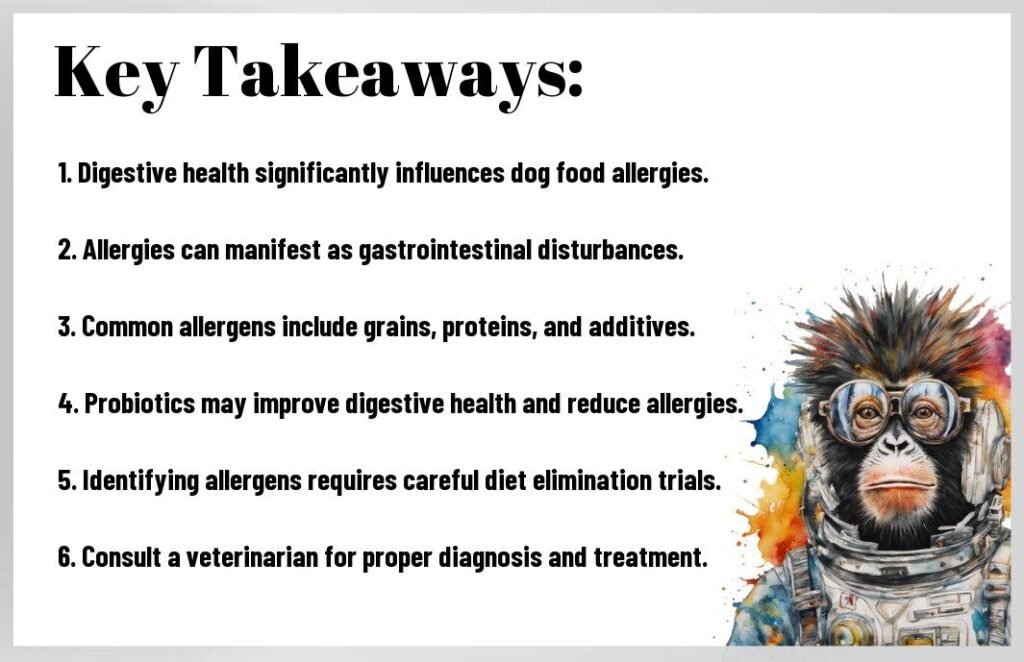Exploring The Link Between Dog Food Allergies And Digestive Health

It’s important for you to understand the intricate connection between your dog food allergies and their digestive health. Many pet owners overlook the signs of food sensitivities, which can lead to chronic gastrointestinal issues. In this article, we will explore how specific ingredients in dog food can trigger allergic reactions, the symptoms to watch for, and the relationship between these allergies and overall digestive function. Empower yourself with this knowledge to provide better nutrition and healthcare for your furry companion.
Key Takeaways:
- Food Allergies: Pets can develop Dog food allergies to certain ingredients in their diet, leading to symptoms such as itching, gastrointestinal upset, and skin issues.
- Digestive Health: A dog’s digestive health plays a crucial role in how they process food, and any imbalances can exacerbate allergic reactions.
- Symptom Overlap: Symptoms of digestive issues like diarrhea or vomiting may mirror those of dog food allergies, making it imperative to differentiate between the two for proper treatment.
- Ingredient Transparency: Understanding dog food labels and knowing potential allergens in ingredients is vital for managing allergies effectively.
- Veterinary Guidance: Consulting a veterinarian is critical for diagnosing and managing dog food allergies, as well as optimizing your pet’s digestive health through proper diet adjustments.

Understanding Dog Food Allergies
Dog food allergies occurs when your dog’s immune system mistakenly identifies certain ingredients in their food as harmful. This inappropriate immune response triggers various symptoms, ranging from mild to severe. Unlike food intolerance, which may merely cause digestive upset, dog food allergies involve the immune system and can lead to more serious reactions, including skin issues and gastrointestinal problems. Understanding these allergies is crucial for maintaining your dog’s health and ensuring they receive the appropriate nutrition they need.
Definition of Dog Food Allergies
Dogs can develop allergies to food ingredients due to genetic predispositions or environmental factors. These allergies often manifest after your dog has consumed the offending ingredient multiple times, leading to an immune response that results in various symptoms. Identifying the specific allergen is vital to managing your dog’s condition effectively.
Common Symptoms of Dog Food Allergies
Dog Food allergies are typically show up through a variety of symptoms. Common signs include itching and skin irritation, gastrointestinal disturbances like diarrhea or vomiting, and often ear infections. These reactions are your dog’s way of expressing discomfort due to the allergens present in their food.
Symptoms may vary in intensity and type depending on the individual dog and the allergen involved. Some dogs may experience mild itching, while others could face severe gastrointestinal upset or chronic skin conditions. Being vigilant about dietary changes and your pet’s reaction can help in recognizing and addressing dog food allergies early before they escalate.
Types of Allergens in Dog Food
Common allergens in dog food can include proteins, grains, and additives that your dog may react to. Typical ingredients that lead to allergies include beef, chicken, dairy, wheat, and soy. It’s vital to note that not all dogs will react to the same allergens, and identifying your dog’s specific sensitivities can require patience and careful monitoring.
- Chicken
- Dairy products
- Wheat
- Soy
Perceiving these allergens and understanding their effects can help you make informed decisions about your dog’s diet, ensuring that they remain healthy and avoid allergic reactions.
| Common Food Allergens | Possible Reactions |
| Chicken | Skin rashes, ear infections |
| Dairy | Vomiting, diarrhea |
| Wheat | Itching, chronic skin conditions |
| Soy | Gas, bloating, itching |
Understanding the common allergens in dog food can significantly help you in selecting appropriate nutrition for your furry companion. You might need to keep a food diary and track any changes in your dog’s health or behavior to pinpoint specific triggers effectively.
Conclusion
A proactive approach to managing your dog’s diet can play a pivotal role in enhancing their quality of life. By educating yourself on dog food allergies, their symptoms, and the potential allergens present in pet’s food, you can take steps towards preventing adverse reactions. Remain observant and consult your veterinarian for tailored advice that meets your dog’s unique health requirements.

The Role of Digestive Health
Overview of Canine Digestive System
Overview of the canine digestive system reveals that it is a highly specialized system designed to break down various types of food. Unlike humans, dogs’ digestive tracts are shorter, which allows for a quicker processing of food and is particularly suited for a carnivorous diet. Your dog’s digestive journey begins in the mouth, where enzymes in saliva start breaking down food. It continues through the esophagus to the stomach, where gastric acids and enzymes further digest the food before passing it into the small intestine, where nutrients are absorbed. The remaining waste then moves into the large intestine for further absorption of water and eventual excretion.
Understanding this process is crucial for you as a pet owner, especially when evaluating dog food allergies and how they may affect your dog’s health. If your dog’s digestive system is compromised, it can lead to significant health issues, as it will struggle to absorb necessary nutrients necessary for maintaining overall health and immunity.
Importance of Gut Microbiome
Digestive health in dogs is profoundly influenced by the gut microbiome, a complex ecosystem of microorganisms residing in the intestines. These beneficial bacteria play a critical role in digestion by breaking down food particles that your dog’s body can’t digest on its own, producing necessary nutrients, and supporting a healthy immune response. By maintaining a balanced gut microbiome, you can help prevent issues like dog food allergies, inflammatory bowel disease, and other digestive disorders.
Health of the gut microbiome is also key for your dog’s overall wellbeing. Imbalances, which can arise from poor diet, antibiotics, or other stressors, can lead to dysbiosis, a condition characterized by an unhealthy microbial population. This imbalance can worsen food allergies and digestive disturbances, creating a vicious cycle that negatively impacts your dog’s quality of life.
Digestive Disorders and Their Symptoms
Overview of digestive disorders in dogs highlights a range of health issues that can arise due to food allergies or an unhealthy digestive system. Common disorders include gastrointestinal infections, inflammatory bowel disease, and food intolerances. Each of these conditions can manifest differently, impacting your dog’s appetite, energy levels, and overall demeanor. Recognizing these symptoms early can be crucial in managing your dog’s health effectively.
Symptoms of digestive disorders may include persistent vomiting, diarrhea, bloating, constipation, and noticeable changes in appetite. These signs can greatly affect your dog’s quality of life and may indicate a need for dietary adjustments or veterinary attention. By keeping a watchful eye on your dog’s behavior and eating patterns, you can assist in diagnosing potential issues before they escalate into more serious health concerns.
Connection Between Dog Food Allergies and Digestive Health
Not every case of digestive distress in dogs is due to a food allergy, but when allergies are involved, they can significantly influence how your dog processes and absorbs nutrients. Understanding this connection is crucial for any dog owner, especially if your pet displays signs of gastrointestinal trouble. When your dog ingests an allergen, the immune system triggers a response that may not only affect the skin or respiratory system but can also lead to inflammation in the digestive tract, causing a cascade of digestive issues.
How Allergies Influence Digestion
Allergies can disrupt your dog’s digestive health by leading to an imbalanced gut microbiome. This imbalance can hinder the absorption of nutrients, decrease the efficiency of digestive enzymes, and ultimately leave your dog feeling unwell. For instance, if a specific ingredient in your dog’s food is triggering an allergic response, it can result in chronic inflammation, which can manifest as diarrhea, vomiting, or even constipation.
Signs of Digestive Disturbances from Allergies
From nausea to stomach cramps, pets suffering from dog food allergies often exhibit signs of digestive troubles. Common symptoms may include excessive gas, watery stools, and a general reluctance to eat. In some cases, you might notice your dog eating grass or other non-food items as they attempt to alleviate their discomfort. Being observant of these signs will help you identify if dog food allergies are playing a role in their digestive distress.
A quick assessment of your dog’s diet can reveal clues about potential allergens. If you notice that your dog’s stomach troubles coincide with changes in their food or introduce new treats, it’s time to consider food sensitivities. Many dog owners overlook the dietary sources of their pets’ issues, focusing instead on external factors. However, understanding that the food they consume could be contributing to their discomfort is crucial for finding a resolution.
Long-Term Impact on Digestive Health
With chronic exposure to food allergens, your dog’s digestive health may deteriorate over time. Long-term inflammation from allergies can lead to conditions such as inflammatory bowel disease (IBD) or other serious gastrointestinal disorders. This chronic situation not only compromises the quality of life for your dog but can also complicate treatment efforts down the road. Recognizing and addressing dog food allergies early can prevent long-lasting harm to your dog’s digestive system.
Digestive issues stemming from dog food allergies can have a ripple effect throughout your dog’s overall health. The ongoing strain on the digestive system can compromise nutrient absorption, leading to deficiencies that may impact their immune system, energy levels, and even the health of their coat and skin. Therefore, being proactive in identifying and managing food allergies can significantly improve your dog’s long-term health and well-being.

Identifying Dog Food Allergies
Now that you understand the potential impact of dog food allergies on your pet’s overall health, the next step is identifying whether your furry friend is indeed suffering from a food allergy. This is crucial as many symptoms, such as itching, gastrointestinal distress, and skin infections, often overlap with other health issues. Recognizing the signs early can help you take necessary actions and improve your dog’s quality of life.
Diagnostic Testing Options
To effectively diagnose dog food allergies in your canine, various testing options are available. Blood tests are commonly used to evaluate the presence of specific antibodies related to food allergens. While these tests can provide some insight, they are not always conclusive and often require follow-up tests. Alternatively, skin testing can also be performed, though it is less common for food allergies specifically. A thorough examination by a veterinarian is important to determine the most appropriate testing method for your dog.
In addition to traditional diagnostic testing, your veterinarian may recommend a thorough review of your dog’s diet and health history. This involves discussing your dog’s symptoms, potential allergens, and previous dietary changes. Combining clinical evaluation with laboratory results can culminate in a more accurate diagnosis of food allergies.
Elimination Diets: Purpose and Process
For many dog owners, an elimination diet is the gold standard for identifying food allergies. This dietary approach involves switching your dog to a new diet that contains a limited number of ingredients, typically novel proteins and carbohydrates your dog has never consumed before. By excluding common allergens such as beef, dairy, and wheat, you can observe any changes in your dog’s symptoms over a specified period, usually around 8 to 12 weeks.
During the elimination diet, it’s critical to avoid any treats, food supplements, or flavored medications that might contain allergens. Maintaining strict adherence to the elimination period allows you to accurately assess whether your dog’s symptoms improve. After this initial phase, a gradual reintroduction of foods can help identify the specific allergens causing the issues. Each food should be introduced one at a time, while closely monitoring your dog’s reactions, to pinpoint any problematic ingredients effectively.
Understanding the elimination diet process can be a powerful tool in managing your dog’s food allergies. This method not only enables you to identify triggers but also empowers you to adjust your dog’s diet accordingly. It may require some patience and diligence, but the payoff is the potential for a healthier and happier pet.
Importance of Veterinary Guidance
To successfully identify and manage food allergies in your dog, seeking veterinary guidance is vital. Your veterinarian can help tailor the elimination diet to ensure it’s nutritionally balanced and suitable for your dog’s age, size, and health status. Moreover, having a professional involved means you’ll receive expert advice on managing any symptoms that might arise during the process.
Having a veterinarian by your side can provide peace of mind as you launch on this journey. They can help differentiate food allergies from other issues and offer personalized recommendations for dietary changes, monitoring, and follow-up testing. Collaborating with a veterinary professional ensures your dog remains healthy and avoids unnecessary complications.
It’s crucial to remember that while identifying food allergies in your dog can be a complex process, having proper veterinary guidance and adherence to an elimination diet can lead to effective solutions for addressing this issue. Navigating your dog’s dietary needs with veterinary expertise will help you make informed decisions and enhance your furry friend’s well-being.
Dietary Management for Allergies and Digestive Health
Once again, it’s crucial to emphasize the significance of appropriate dietary management when addressing your dog’s food allergies and digestive health. When adjusting your dog’s diet, you should closely monitor how their body reacts to various ingredients. If you suspect your dog may be suffering from food allergies, learning How to Recognize Signs of Food Intolerance in Your Dog can be invaluable. Recognizing these signs early on can lead to more effective dietary management and improved overall health.
Selecting Hypoallergenic Dog Food
Dietary management begins with selecting hypoallergenic dog food, which is specifically formulated to minimize allergic reactions. These diets often include novel protein sources, such as venison or pea protein, that your dog may not have been exposed to previously. Additionally, hypoallergenic foods are typically free from common allergens like wheat, soy, and dairy, making them a safer choice for dogs with sensitivities. Always consult with your veterinarian before making any drastic dietary changes, as they can offer personalized advice based on your dog’s unique needs.
When choosing a hypoallergenic diet, you should also look for limited ingredient formulas that contain fewer components. This helps to reduce the likelihood of your dog encountering allergens while still providing vital nutrients. It’s vital to experiment methodically; introduce new foods one at a time and observe your dog for any signs of distress or allergic reaction.
Role of Probiotics and Prebiotics
On your journey to improving your dog’s digestive health, incorporating probiotics and prebiotics into their diet can be a game-changer. Probiotics are beneficial bacteria that support gut health, while prebiotics act as food for these good bacteria, promoting a balanced gut microbiome. A well-functioning digestive system can significantly reduce inflammation and the occurrence of food allergies, as it helps your dog properly metabolize their food and absorb nutrients more effectively.
Furthermore, a healthy gut flora can enhance your dog’s immune system, making them less reactive to allergens. By intuitively integrating probiotics and prebiotics into your dog’s diet, either through specialized dog foods or supplements, you can effectively support their overall digestive health and reduce the chances of adverse reactions.
Home-Cooked Diets: Benefits and Risks
Food allergies often lead dog owners to consider home-cooked diets, as they allow for ultimate control over the ingredients included in your dog’s meals. This can be particularly beneficial for dogs with severe allergies, as you can eliminate any suspected allergens while tailoring the diet to meet their specific nutritional needs. Cooked meals also have the added advantage of being more palatable, which can aid in encouraging picky eaters to consume their food. However, it is vital to proceed cautiously.
Nonetheless, home-cooked diets come with their own set of risks. Improperly balanced meals can lead to nutritional deficiencies or excesses that could negatively impact your dog’s health. You should ideally work with a veterinary nutritionist to develop a balanced meal plan to ensure your dog receives all the vital nutrients required for a healthy life.
The goal of carefully managing your dog’s diet is to ensure their long-term health and comfort. Regular check-ins with your veterinarian can help you tweak or improve your dog’s dietary routine, making adjustments as necessary based on their evolving health status.

Preventative Measures and Lifestyle Adjustments
Many pet owners underestimate the importance of preventative measures when it comes to managing dog food allergies and supporting digestive health. By incorporating lifestyle adjustments, you can not only minimize the risk of allergic reactions but also enhance your dog’s overall well-being. Being proactive in your approach will give you peace of mind and provide your furry friend with a higher quality of life.
Monitoring and Adjusting Diet
On a day-to-day basis, it’s important to keep a close eye on what your dog is eating. Regularly monitoring your dog’s diet can help you identify potential allergens and triggers of digestive issues. If you notice any changes in their behavior, such as itching, gastrointestinal distress, or lethargy, it might be time to adjust their diet. Consulting with your veterinarian can guide you in selecting hypoallergenic or specialized food that caters to your dog’s specific needs.
On top of monitoring their food, managing treats and snacks is equally important. Always read ingredient labels and opt for treats designed for dogs with food allergies. Introduce new items one at a time, keeping track of any reactions, so you can pinpoint exact triggers without compromising your dog’s digestive health.
Regular Veterinary Check-ups
Lifestyle changes play a pivotal role in preventing food allergies and supporting your dog’s digestive health. Regular veterinary check-ups are an important component of this strategy. These visits, usually recommended on an annual basis, can help your veterinarian detect any potential health issues early on, including allergies that might impact your dog’s digestive systems, such as inflammatory bowel disease or parasites.
This proactive engagement with your veterinary team can also lead to personalized dietary recommendations based on your dog’s unique health profile. It’s important to communicate any concerns regarding allergies or digestive problems that may arise, as this information aids your vet in providing the most effective care and adjustments to your dog’s diet.
The Influence of Environment on Allergies
Environment plays a significant role in the development and management of dog food allergies. Factors such as seasonal changes, exposure to dust and pollen, or even certain cleaning products can contribute to allergic responses in your pup. To improve your dog’s digestive health and overall quality of life, it’s crucial to create a safe and clean living space for them.
It’s advisable to minimize exposure to potential allergens by maintaining a tidy environment, using air purifiers, and opting for hypoallergenic cleaning products. Monitoring your dog’s reactions to their environment can provide insight into whether their allergies are exacerbated by external factors, allowing you to make informed lifestyle changes that promote their health.
Conclusion
Considering all points, it becomes clear that the relationship between dog food allergies and digestive health is a crucial aspect of pet care you should not overlook. Understanding whether your dog is experiencing food allergies can significantly impact their overall well-being, particularly their gastrointestinal health. You must pay attention to any signs of digestive distress, such as bloating, diarrhea, or changes in appetite, as these can serve as indicators of an underlying food allergy. By recognizing these symptoms, you can make more informed decisions regarding your dog’s diet and care.
FAQ
Q: What are common symptoms of dog food allergies?
A: Common symptoms of dog food allergies in dogs include itching and scratching, skin irritation or rashes, gastrointestinal issues such as vomiting or diarrhea, ear infections, and excessive licking of paws or other body parts. It’s important to differentiate these symptoms from other conditions, so consulting a veterinarian is crucial for an accurate diagnosis.
Q: How can I determine if my dog has a food allergy?
A: To determine if your dog has a food allergy, you should consult a veterinarian who may recommend an elimination diet. This involves feeding your dog a novel protein and carbohydrate source for several weeks to see if symptoms improve. After the elimination phase, you can slowly reintroduce other ingredients to identify any allergens. Keeping a journal of your dog’s diet and symptoms can also be helpful.
Q: What role does digestive health play in food allergies?
A: Digestive health plays a significant role in food allergies for dogs. A healthy gut ensures proper digestion and absorption of nutrients, and it can help maintain a balanced immune response. Imbalances in gut bacteria or damage to the gut lining can lead to increased permeability (leaky gut), which may heighten the risk of food allergies. Supporting digestive health through prebiotics and probiotics, along with a balanced diet, can aid in preventing food allergies.
Q: Are there specific dog food ingredients that are more likely to cause allergies?
A: Yes, certain ingredients are more commonly associated with food allergies in dogs. These include proteins such as beef, chicken, lamb, eggs, and dairy, as well as grains like wheat and corn. Other less common allergens can include soy, fish, and certain vegetables. Each dog is unique, so it’s necessary to perform an elimination diet to pinpoint specific triggers for your pet.
Q: Can dog food allergies lead to long-term health issues?
A: Yes, untreated dog food allergies can lead to long-term health issues such as chronic skin conditions, repeated gastrointestinal problems, and secondary infections due to skin irritation. Additionally, ongoing digestive imbalances can contribute to malnutrition since dogs may not absorb necessary nutrients. It’s critical to address food allergies promptly to protect your dog’s overall health and well-being.




